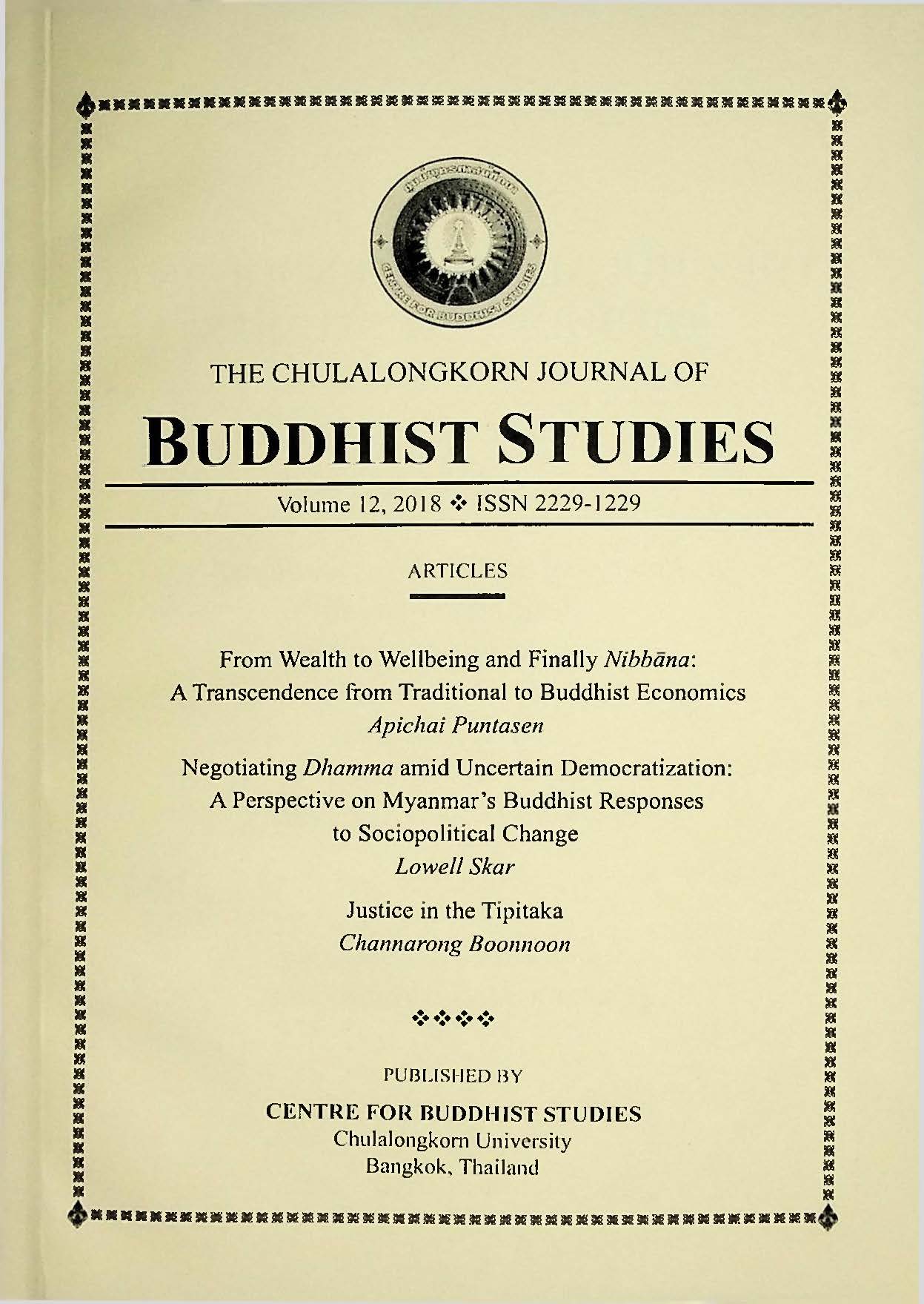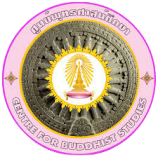NegotiatingDhamma amid Uncertain Democratization: A Perspective on Myanmar’s Buddhist Responses to Sociopolitical Change
Keywords:
Myanmar Buddhism, sociopolitical change, nationalist monksAbstract
This essay examines some ways that the Buddhist monastic community (sangha) in Myanmar has been part of the political transition in that country after 2010. It relates these recent Buddhist-state interactions to deeper developments in Myanmar society and culture, especially those from the early 20th century. It argues that current developments in the Buddhist sangha and Myanmar’s political transition toward democracy are part of an ongoing and uncertain negotiation process. These negotiations are between a new, hybrid, and still embryonic democratically-elected government constrained by military power and diverse evolving forms of Buddhist organization and practice. Both arc entangled within an anxious and fractious society that is experiencing uncertain socioeconomic changes and conflicted transnational forces. The negotiations of a diverse Buddhist community thus have complex and unresolved relations to Myanmar’s society and its fledgling democratization.
References
Badgley, J. H. “The Theravada Polity of Burma.” Tonan Asia K. 2:4 (March 1965): 52-75.
Bechert, H. ‘“To be a Burmese is to be a Buddhist’: Buddhism in Burma,” The World of Buddhism, London: Thames and Hudson, 1995.
Brae de la Perriere, B. “An Overview of the Field of Religion in Burmese Studies.” Asian Ethnology 68:2 (2009): 185-210.
Braun, E. The Birth of Insight: Meditation, Modern Buddhism, and the Burmese MonkLedi Sayadaw. Chicago: University of Chicago Press, 2013.
BSPP (Burma Socialist Programme Party). The System of Correlation of Man and His Environment, Rangoon: BSPP, 1973.
Casanova, J. Public Religions in the Modern World. Chicago: University of Chicago Press, 1994.
Cesari, J. “Religion and Democratisation: When and how it matters,” Journal of Religious and Political Practice, 2:2 (2016): 131-134.
Cesari, J., and J. Fox. “Institutional Relations Rather Than Clashes of Civilizations: When and How Is Religion Compatible with Democracy?” International Political Sociology 10 (2016): 241-257.
Chirot, D. Modern Tyrants: The Power and Prevalence of Evil in Our Age, New York: The Free Press, 1994.
Frydenlund, I. “Religious Liberty for Whom? The Buddhist Politics of Religious Freedom during Myanmar’s Transition to Democracy,” Nordic Journal of Human Rights 35:1 (2017), 55-73.
Gravers, M. Nationalism as Political Paranoia in Burma: An Essay on the Historical Practice of Power. Richmond, Surrey: Curzon, 1999.
Haynes, J. “Religion and democratizations: an introduction,” Democratization 16:6(2009): 1041-1057.
Hetherington, J. “Facebook Bans Buddhist Monks for Muslim Hate Messages—But They’re Fighting Back with Fake Profiles.” Newsweek, June 9, 2018.
Houtman, G. Mental Culture in Burmese Crisis Politics: Aung San Suu Kyi and the National League for Democracy. Tokyo: Tokyo University of Foreign Studies, Institute for the Study of Languages and Cultures of Asia and Africa, 1999.
Hurd, E. S. Beyond Religious Freedom: The New Global Politics of Religion. Princeton: Princeton University Press, 2015. International Crisis Group. “Buddhism and State Power in Myanmar.” Asia Report No. 290. September 5, 2017.
Jordt, I. Burma's Mass Lay Meditation Movement: Buddhism and the Cultural Construction of Power. Athens: Ohio University Press, 2007.
Kawakami, H., ed. Buddhism and the Political Process. New York: Palgrave Macmillan, 2016.
Kunkier, M. and J. Leininger. “The multi-faceted role of religious actors in democratization processes: empirical evidence from five young democracies,” Democratization, 16:6 (2009): 1058-1092.
Kunkier, M. and J. Leininger. “Religion and Politics,” in George Thomas Kurian ed., The Encyclopedia of Political Science. Washington, D.C/.CQ Press, 2011, 1450-1453.
Kyaw Phyo Tha. “NLD, Ma Ba Tha in War of Words over campaign claims.” The Irrawaddy, September 24, 2015. Accessed July 6, 2017. https://www.irrawaddy.com/election/news/nld-ma-ba-tha-in-war-of-words-over-campaign-claims
Kyaw Phyo Tha. “Ma Ba Tha Threatens Nationwide Protests against Shwedagon Highrise Projects.” The Irrawaddy, June 12, 2015. Accessed July 6, 2017. https://www.irrawaddy.com/news/burma/ma-ba-tha-threatensnationwide-protests-against-shwedagon-highrise-projects.html
Kyaw San Wai. “Myanmar’s Religious Violence: A Buddhist ‘Siege Mentality’ at Work.” RSiS Commentary. CO 14037, February 20, 2014.
Kyaw Thu Mratt. “What Next for Ma Ba Tha?” Frontier Myanmar, June 23, 2016. Accessed July 20, 2019. https://frontiermyanmar.net/en/what-next-for-ma-ba-tha
Lawi Weng. “Analysis: Army Plays Spoiler to Religious Reform,” The Irrawaddy, June 20, 2018. Accessed June 21, 2018. https://www.irrawaddy.com/news/burma/analysisarmy-plays-spoiler-religious-reform.html
Leider, J. “Text, Lineage, and Tradition in Burma: The Struggle for Norms and Religious Legitimacy under King Bodawphaya (1782-1819).” Journal of Burma Studies 9, no. 1 (2004): 82-129.
Lintner, B. Outrage: Burma s Strugglefor Democracy (Hong Kong: Review Publishing, 1989.
Matthews, B. “Buddhism under a Military Regime: The Iron Heel in Burma.” Asian Survey, 33:4 (1993): 408-423. Matthews, B. “The Present Fortune of Tradition-bound Authoritarianism in Myanmar,” Pacific Affairs 71:1 (1998): 7-23.
Maung Maung Gyi (1983) Burmese Political Values. New York: Praeger, 1993.
Mendelson, E. M. Sangha and State in Burma: A Study of Monastic Sectarianism and Leadership. Ithaca, NY: Cornell University Press, 1975.
Moe Myint. “NLD Accuses Ma Ba Tha of Unlawful Influence.” The Irrawaddy, September 23, 2015. Accessed March 7, 2018. http://www.irrawaddy.org/election/news/nldaccuses-ma-ba-tha-of-unlawful-influence
Moe Myint. “Ma Ba Tha Embraces Political Fray, Risking Election Year Sanction.” The Irrawaddy, June 9, 2015. Accessed March 7,2018. http://www.irrawaddy.org/burma/maba-tha-embraces-political-fray-risking-election-year-sanction.html.
Mya Maung. Totalitarianism in Burma: Prospects for Economic Development, New York: Paragon House, 1992.
Nyein Nyein. “Nationalist Monks call NGOs “Traitors” for Opposing Interfaith Marriage Bill.” The Irrawaddy, May 12, 2014. Accessed March 15, 2018. https://www.irrawaddy.com/news/burma/nationalist-monks-callngos-traitors-opposing-interfaith-marriage.html
Radio Free Asia. “Civil Society Groups Urge Myanmar to Drop Bills to ‘Protect’ Religion, Race.” Radio Free Asia, January 29, 2015. Accessed March 15, 2018. http://www.rfa.org/english/news/myanmar/bills-01292015150834.html.
Sarkisyanz, M. Buddhist Backgrounds of the Burmese Revolution, The Hague: M. Nijhoff, 1965.
Schielke, S. “Second thoughts about the anthropology of Islam, or how to make sense of grand schemes in everyday life,” Zentrum Modemer Orient Working Paper, 2010.
Schissler, M., et al. “Reconciling Contradictions: Buddhist-Muslim Violence, Narrative making and Memory in Myanmar.” Journal of Contemporary Asia 47:3 (2017): 376395-.
Schober, J. Modern Buddhist Conjunctures in Myanmar: Cultural Narratives, Colonial Legacies, and Civil Society. Honolulu: University of Hawai’i Press, 2011.
Seekins, D. M. “The State and the City: 1988 and the Transformation of Rangoon,” Pacific Affairs 78 (2005), no. 2.
Seekins, D. M. The Disorder in Order: The Army State in Burma Since 1962. Bangkok: White Lotus Press, 2002.
Sherwell, P. “Burma’s Radical Monks Pray for Holy Intervention in Historic Election.” The Telegraph, October 4, 2015. Accessed February 6, 2018. http://www.telegraph.co.uk/news/worldnews/asia/burmamyanmar/11910768/Burmasradical-monks-prayfor-holy-intervention-in-historicelection.html
Smith, D. E. Religion and Politics in Burma. Princeton, NJ: Princeton University Press, 1965.
Solomon, F. “Burma Parliament Approves Contentious Race and Religion Bills.” The Irrawaddy. August 20, 2015. Accessed February 7, 2018. http://www.irrawaddy.org/election/news/burma-parliament-approves-contentiousrace-and-religion-bills
Spiro, M. E. Buddhism and Society: A Great Tradition and its Burmese Vicissitudes. Berkeley: University of California Press, 1982.
Su Myat Aung. 2014. “The Nature of Buddhist Sunday dhamma Schools in Myanmar.” Paper presented at International Burma Studies conference, Singapore.
Tin Maung Maung Than. “The Sangha and Sasana in Socialist Burma.” Sojourn 3:1 (1988): 26-61.
Turner, A. Saving Buddhism: The Impermanence of Religion in Colonial Burma. Honolulu: University of Hawai’i Press, 2014.
Wade, F. Myanmar’s Enemy within: Buddhist Violence and the Making of a Muslim Asian Arguments. London: Zed Books, 2017.
Wade, F. “Myanmar: Marketing a Massacre.” New York Review of Books Daily. October 17,2017. Accessed March 17, 2017. http://www.nybooks.com/daily/2017/10/17/myanmar-marketing-a-massacre/
Walton, M. J. “Buddhist Monks and Democratic Politics in Contemporary Myanmar/' 56-77 in Kawakami, cd. Buddhism and the Political Process. New York: Palgrave Macmillan, 2016.
Walton, M. J. Buddhism, Politics and Political Thought in Myanmar. Cambridge: Cambridge University Press, 2017.
Walton, M. J., and S. Hayward. “Democratization, Communal Violence, and Contesting Buddhist Narratives in Contemporary Myanmar.” Policy Studies, East-West Center, 71 (2014).
Walton, M. J., M. McKay, and Daw Khin Mar Mar Kyi. “Women and Myanmar’s ‘Religious Protection Laws’.” Review of Faith and International Affairs 13 (2015): 36-49.
Yen Snaing. 2014. “Activists Face Violent Threats after Opposing Interfaith Marriage Bill.” The Irrawaddy. June 4, 2014. Accessed March 15, 2018. https://www.irrawaddy.com/news/burma/activists-face-violent-threatsopposing- interfaith-marriage-bill.html
Zollner, H. B. Neither Saffron nor Revolution: A Commentated and Documented Chronology of the Monks9 Demonstrations in Myanmar in 2007 and their Background. 2009. SUdostasien Working Papers, No. 36. Institut fur Asicnund Afrikawissenschaftcn Philosophische Fakultat HI der Humboldt-Universitat zu Berlin.







